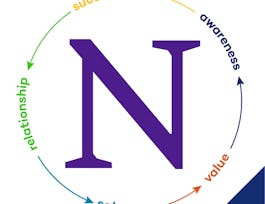Recently revised and updated! Effective teamwork and group communication are essential for your professional and personal success. In this course you will learn to: make better decisions, be more creative and innovative, manage conflict and work with difficult group members, negotiate for preferred outcomes, improve group communication in virtual environments, develop a better overall understanding of human interaction, and work more effectively as a team. Our goal is to help you understand these important dynamics of group communication and learn how to put them into practice to improve your overall teamwork.


Teamwork Skills: Communicating Effectively in Groups
Taught in English
Some content may not be translated
208,088 already enrolled
(3,214 reviews)
Recommended experience
What you'll learn
Recognize how hidden forces of context, systems, institutions, and interactions design affect group interaction
Develop decision making practices in order to become more creative and innovative
Learn how to communicate to resolve or diffuse group conflicts
Make better decisions about using technology for group work based on key practical and conceptual considerations
Skills you'll gain
Details to know

Add to your LinkedIn profile
4 quizzes
See how employees at top companies are mastering in-demand skills


Earn a career certificate
Add this credential to your LinkedIn profile, resume, or CV
Share it on social media and in your performance review

There are 4 modules in this course
Week 1 is all about communication. But not the common sense or taken-for-granted notions of communication you might expect. Instead, we’re going to rethink communication and challenge some of the conventional wisdom about communication that is common in our society. We’ll compare and contrast different theories or models of communication, and see if we can develop a more sophisticated understanding of communication to understand the complexities of human interaction in today’s groups. We’ll also explore some of the hidden forces of group communication, like context, systems and institutions, and design. These are all things that are “present” in any group situation, influencing how we interact with each other, but easy to miss if we’re not looking. We want to expand our field of vision, so to speak, so we have a fuller understanding of what’s happening in any group situation.
What's included
8 videos1 reading1 quiz2 discussion prompts1 plugin
Week 2 focuses on group development and decision making. We’ll look at how groups come together through socialization, how they develop norms, and how roles emerge. And we’ll compare and contrast different models that explain these processes. We’ll examine the various decision making traps that groups can fall into, while also developing better practices for making good group decisions. And we’ll explore how groups can be more creative and innovative in their decision making.
What's included
7 videos1 quiz1 peer review1 discussion prompt
Week 3 is all about conflict, difference, and diversity. We’ll learn how groups can have a good fight and how you can choose the right words in a dispute…as well as how to negotiate with others when things get difficult. We’ll also explore why difference and diversity are so important for group communication, and how understanding the concept of identity is critical for our involvement in groups. And we’ll pay special attention to communication and gender, one of the most significant aspects of difference and diversity for groups to understand.
What's included
7 videos1 quiz1 discussion prompt
Week 4 covers group communication and technology…an increasingly prevalent aspect of the modern landscape of group work we must understand. We’ll look at the concept of virtual work and how groups are using technology, as well as various models and theories of media functionality and information processing. We’ll cover several practical and conceptual issues we should always keep in mind when it comes to technology and group communication, and we’ll explore some cutting-edge thinking about technology and group work through the fascinating theory of sociomateriality.
What's included
7 videos1 reading1 quiz1 peer review1 discussion prompt
Instructor

Offered by
Recommended if you're interested in Leadership and Management

University of Virginia

Northwestern University

University of Leeds

Coursera Instructor Network
Why people choose Coursera for their career




Learner reviews
Showing 3 of 3214
3,214 reviews
- 5 stars
80.79%
- 4 stars
14.32%
- 3 stars
2.48%
- 2 stars
0.77%
- 1 star
1.61%
New to Leadership and Management? Start here.

Open new doors with Coursera Plus
Unlimited access to 7,000+ world-class courses, hands-on projects, and job-ready certificate programs - all included in your subscription
Advance your career with an online degree
Earn a degree from world-class universities - 100% online
Join over 3,400 global companies that choose Coursera for Business
Upskill your employees to excel in the digital economy
Frequently asked questions
Access to lectures and assignments depends on your type of enrollment. If you take a course in audit mode, you will be able to see most course materials for free. To access graded assignments and to earn a Certificate, you will need to purchase the Certificate experience, during or after your audit. If you don't see the audit option:
The course may not offer an audit option. You can try a Free Trial instead, or apply for Financial Aid.
The course may offer 'Full Course, No Certificate' instead. This option lets you see all course materials, submit required assessments, and get a final grade. This also means that you will not be able to purchase a Certificate experience.
When you purchase a Certificate you get access to all course materials, including graded assignments. Upon completing the course, your electronic Certificate will be added to your Accomplishments page - from there, you can print your Certificate or add it to your LinkedIn profile. If you only want to read and view the course content, you can audit the course for free.
You will be eligible for a full refund until two weeks after your payment date, or (for courses that have just launched) until two weeks after the first session of the course begins, whichever is later. You cannot receive a refund once you’ve earned a Course Certificate, even if you complete the course within the two-week refund period. See our full refund policy.


